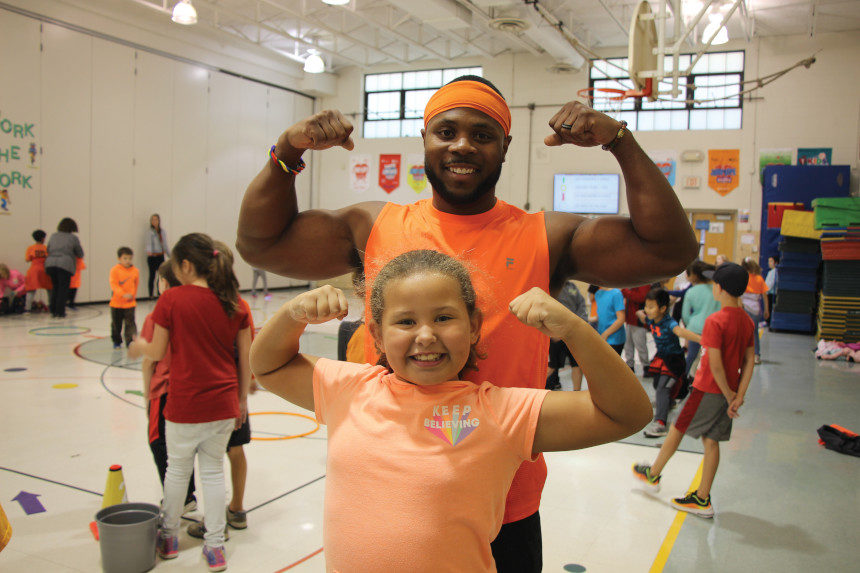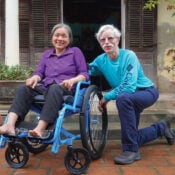For Darrion Cockrell, “P.E.” stands for more than physical education. It’s also physical entertainment. The buff Cockrell teaches P.E. with a vaudevillian’s madcap flair, whether telling jokes on the morning announcements at Crestwood Elementary School in St. Louis or posting quirky pandemic workout videos for stuck-at-home students. In a Christmas video, he led exercises dressed as Santa with his fitness elf, 3-year-old son Dawson. In other videos, the two portray superheroes and wear wigs to resemble ’80s exercise guru Richard Simmons.
“I’ll do anything to get these kids engaged,” says Cockrell, better known as Mr. D.C. by the students. “I’ll stand on my head. I’ll do flips. I’ll dance. Anything to put a smile on these kids’ faces.”
Cockrell’s fun-first exercise programs don’t just target schoolkids. He also runs weekly after-school workouts for teachers and parents, and in 2020, he was named Missouri’s 2021 Teacher of the Year for his impact on the community’s physical, emotional, and mental well-being. But what makes the charismatic Cockrell so special isn’t just his passion for people. It’s his fortitude. Cockrell survived a brutal inner-city St. Louis childhood far different from the comfy lives of his suburban students.
When Cockrell was 4, his father was murdered. His mother was addicted to crack cocaine. He entered the foster care system at age 6. Some foster parents would hit him; so would their kids. By age 10, Cockrell had joined a gang. “What I remember most was a lot of sadness,” he says. “When I think back, it’s crazy how many times I see myself sitting alone crying because I felt like my life was nothing.”
In third grade, he attended school in a largely white suburban neighborhood as part of a state desegregation program. Before then, his attitudes toward white people were based on implicit biases and negative interactions with police officers, social workers, and judges, he says. While the culture shock at his new school was jarring, it also began to change his perception about race: “The people there supported me. They pushed me. They loved me. They helped with some of those traumas that I was dealing with at home,” he says. “It changed my whole mindset, and I started breaking down the shell I had built.”
When I think back, it’s crazy how many times I see myself sitting alone crying because I felt like my life was nothing.
Yet each afternoon, when Cockrell returned to the inner city, he was again surrounded by addicts and alcoholics. There was discarded drug paraphernalia all over the streets. “I was taking all these steps forward, but then I had to go home and take these steps backward,” he says. “I’m thinking, ‘Okay, when I get home, is my mom going to be high? Is my grandmother going to be drunk? Are the lights going to be on? Are we going to have a meal?’ That didn’t allow me to focus on being a student. It was hard.”
In middle school, a counselor, Maureen Huneke, entered his life. She knew that Cockrell and other boys loved sports, so she formed a basketball team to motivate them academically. Players had to meet GPA requirements and perform well on school projects to practice and play in games. “She’d take us out to lunch. She would drive us to our games. She sewed our basketball uniforms. She treated us with so much love and support — like we were her own kids,” he says. “I became super close to her.”
Much like Huneke, other adults became positive role models. At age 13, he was placed in a now-defunct St. Louis orphanage, the General Protestant Children’s Home. Moving to the home was frightening yet transformational, providing him with access to counselors, therapists, and reading specialists. “I learned values that I never learned in the city — respect, responsibility, honesty, empathy for other people,” he says. “That home completely changed my life. They broke me down and built me back up.”
In eighth grade, Cockrell started playing football, which led to another positive change. He had become close with his coach and his family, and they asked him to live with them. He became like a son. “I never looked at my dad like he was a white dad or my mom like she was a white mom,” he says. “I just thought, ‘This is my mom. And this is my dad.’ That was new to me. I embraced this 100 percent, and they opened me up to so much in this world. We would go on vacations and I was like, vacation? What is that?”
Now in a stable, loving environment, he focused on his studies. After high school, he attended Millikin University and played football. A shoulder injury ended his pigskin career, so he transferred to the University of Missouri-St. Louis (UMSL). He was drifting academically, until a new girlfriend, who would eventually become his wife, provided motivation. “She said, ‘If you want to extend this relationship, you’ve got to focus on your studies because my mom and dad will not let me be with anybody who doesn’t have an education,’” he says.
He graduated from UMSL in 2013 and started working at Crestwood in 2015. Soon after arriving, he implemented CrestFit, his smile-while-you-sweat fitness programs for students, teachers, and parents.
“The teachers are like, ‘Oh, Mr. D.C. worked me out last night,’ and the kids say, ‘Oh, Mr. D.C. worked us out too — what did you do?’ And then all of a sudden you’ve got that spark and you’re talking to each other.”
His workout program with parents provided another benefit. “I was the only Black person in the school and I didn’t want them to assume anything about me,” he says. “So I created a space where I could work out with them. I wanted them to know me just as a man and a teacher.”
The most rewarding part of the job, he says, is his relationships with students. One young girl told a teacher, “I don’t know if it’s a magic power, but whenever I don’t feel good, Mr. D.C. always knows how to make me feel better.”
Megan Skokovic, who spent five years as Cockrell’s teaching partner, says he works hard to learn about every student, even attending after-school activities like soccer games and dance recitals. “The kids just light up when he enters the room,” she says. “He makes them feel special. And he comes to work every day with the biggest smile on his face.”
Cockrell’s passion, Skokovic believes, stems from his difficult past. “It’s almost like he’s taking care of other people because he wasn’t taken care of himself,” she says. Cockrell says he’s simply following the example of teachers and counselors who changed his life.
“I have friends who are doctors, who are lawyers, who are making all this money, and they wish that they had a job that was as fun as mine,” he says. “This is my dream job.”
Ken Budd is the author of The Voluntourist. His work appears in the 2020 edition of The Best American Travel Writing.
This article is featured in the July/August 2021 issue of The Saturday Evening Post. Subscribe to the magazine for more art, inspiring stories, fiction, humor, and features from our archives.
Featured image: Muscle up! Darrion Cockrell encourages a young pupil at Crestwood Elementary School in St. Louis. “I’ll do anything to get these kids engaged,” he says. (Lindberg Schools)
Become a Saturday Evening Post member and enjoy unlimited access. Subscribe now




Comments
Mr. Cockrell is truly inspirational, overcoming extreme odds to become a positive force and role model through exercise and caring about all the people whose lives he touches daily in doing so.